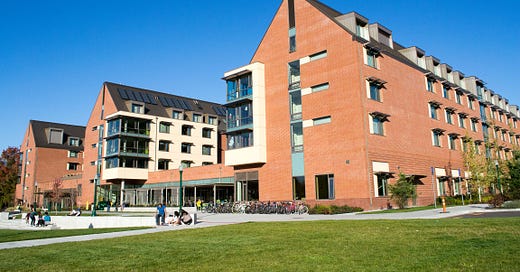UO Student Series: Support Our Students! Addressing the Mental Health Bottleneck in Education
In the academic community, there needs to be greater availability of resources and less social stigma for students who need mental help.
**This post is from a member of Professor David Frank’s class at the University of Oregon. In the coming weeks, we’ll share several more of these posts from young Oregonians. Go Ducks!**
Nathan is pursuing a major in MaCS (Math and Computer Science) at the University of Oregon. His research interests are in ecological modeling and bioinformatics.

I used to work as a tutor at the University of Oregon. In my work, I assisted students on everything from calculus to computer science – some of the most anxiety-inducing things you could study in college. I remember trying to help so many students work through a math problem only for them to throw up their hands and cry “I don’t get it! Okay?”. Other times, I wouldn’t get any input at all and the students would just silently watch me try to explain things – not a great response if your goal is to engage students instead of just lecturing to them. Though I’ve never experienced it myself, one of my fellow tutors said to me that during a session one student got so frustrated that they cried.
I remember thinking how strange it was to hear about that student’s experience. After all, math was supposed to be fun! It was supposed to engage your mind and make you a better student. It was all about crunching numbers and solving puzzles. Yet there I was confronted by the reality of students who were suffering. At the end of every session, I was confronted again and again with the following question: what was so terrible about math that made students cry?
After looking through the scientific literature and reflecting on my own experience in college, I’ve come to realize that perhaps the problem is not with math, but the environment in which it is taught. The education system, especially in STEM fields, has built an incredibly hypercompetitive environment for its students. Students are pushed to get good grades and meet deadlines and commitments with little-to-no support from mentors. When combined with other commitments such as work and relationships, this build-up of stress can lead to poor mental health. An international study published in the Nature Biotechnology journal indicated that graduate students in particular are “six times as likely to experience anxiety and depression compared to the general population.” Many students drop out due to this but even when they don’t, they are subject to this kind of strain throughout their whole academic career.
Our students are being dragged into an abyss of mental illness, and we are losing some of our most valuable talent to self-perceived inadequacy. The education system needs to do better in order to support its students. My work as an educator, my independent research into mental health, and my personal experiences as a student have led me to draft the following three general principles that I advocate would lead to a positive learning environment.
1. Cooperation-focused rather than competition-focused.
In a class, the teacher and the student both have their own goals: the teacher wants the student to learn things and the student wants to learn. The one thing a teacher should not do is create an environment where students feel like they are being “filtered” out. A class should not be a place where students earning “A” grades are separated from students who struggle. It should instead be a supportive environment where a teacher and a student are able to understand each other’s goals and work towards making them happen. Additionally, students should be encouraged to support each other in their studies and their academic community.
2. Robust tutoring and mentoring programs.
There’s often this thought that having a tutor or a mentor means that you are in a remedial program — one that’s designed to make a student “catch up” with the rest of the smart kids. That’s not what tutoring is about, nor what it should be. A student is not catching up with anyone — they’re bettering their self to reach their own goals. Tutoring and mentoring can do that and more: having good mentors is correlated with reduced levels in depression and anxiety. Mentorship is absolutely vital to academic success and thriving.
3. Advocate mental health awareness and support.
There’s a lot of stigma around mental health — a 2013 study from NCBI indicates that over 70% of people with mental illness refuse to get help. We can’t make students get help, but we do need to show that its ok for them to do so. My own experiences going to therapy have shown me that by actively removing the stigma around mental health in a classroom setting, we can help encourage students to get the help they need.
It is of vital importance that we don’t lose our talented students to the abyss of mental illness. Students are not getting help because education is not doing enough to support their well-being. In the academic community, there needs to be greater availability of resources and less social stigma for students who need mental help. We need a welcoming environment that supports students as much as it pushes them. That way, when faced with a math problem or a “real world” problem, a student will feel empowered to take on the challenges that come their way.


